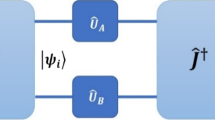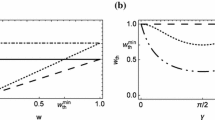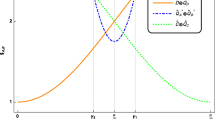Abstract
Quantum games with incomplete information can be studied within a Bayesian framework. We consider a version of prisoner’s dilemma (PD) in this framework with three players and characterize the Nash equilibria. A variation of the standard PD game is set up with two types of the second prisoner and the first prisoner plays with them with probability p and \(1-p\), respectively. The Bayesian nature of the game manifests in the uncertainty that the first prisoner faces about his opponent’s type which is encoded either in a classical probability or in the amplitudes of a wave function. Here, we consider scenarios with asymmetric payoffs between the first and second prisoner for different values of the probability, p, and the entanglement. Our results indicate a class of Nash equilibria (NE) with rich structures, characterized by a phase relationship on the strategies of the players. The rich structure can be exploited by the referee to set up rules of the game to push the players toward a specific class of NE. These results provide a deeper insight into the quantum advantages of Bayesian games over their classical counterpart.





Similar content being viewed by others
References
von Neumann, J., Morgenstern, O.: Theory of games and economic behavior. Princeton University Press, Princeton (1944)
Nash, J.: Equilibrium points in n-person games. Proc. Natl. Acade. Sci. 36, 48 (1950)
Nash, J.: Non-cooperative games. Ann. Math. 54, 286–295 (1951)
Shubik, M.: Game theory models and methods in political economy. In: Arrow, K.J., Intriligator, M.D. (eds.) Handbook of Mathematical Economics, vol. 1, pp. 285–330. Elsevier (1981)
Levy, G., Razin, R.: It takes two: an explanation for the democratic peace. J. Eur. Econ. Assoc. 2, 1–29 (2004)
Axelrod, R.M., Dion, D.: The further evolution of cooperation. Science 242(4884), 1385 (1988)
Shoham, Y.: Computer science and game theory. Commun. ACM Des. Games Purp. 51, 74 (2008)
Meyer, D.: Quantum strategies. Phys. Rev. Lett. 82, 1052–1055 (1999)
Eisert, J., Wilkens, M., Lewenstein, M.: Quantum games and quantum strategies. Phys. Rev. Lett. 83, 3077–3080 (1999)
Eisert, J., Wilkens, M.: Quantum games. J. Mod. Opt. 47, 2543–2556 (2000)
Bleiler S.A.: A formalism for quantum games and an application. arXiv:0808.1389 (2008)
Khan, F.S., Humble, T.: No fixed point guarantee of Nash equilibrium in quantum games. arXiv:1609.08360 (2016)
Kahn, F.S., Phoenix, S.J.D.: Gaming the quantum. Quantum Inf. Comput. 3(3–4), 231–244 (2013)
Kahn, F.S., Phoenix, S.J.D.: Mini-maximizing two qubit quantum computations. Quantum Inf. Process. 12, 2807–3810 (2013)
Kahn, F.S.: Dominant strategies in two-qubit quantum computations. Quantum Inf. Process. 14, 1799–1808 (2015)
Iqbal A., Chappell J.M., Li Q., Pearce C.E.M., Abbott D.: A probabilistic approach to quantum Bayesian games of incomplete information. Quantum Inf. Process. 13, 2783–2800 (2014)
Benjamin, S.C., Hayden, P.M.: Multiplayer quantum games. Phys. Rev. A 64, 030301 (2001)
Landsburg, E.S.: Nash equilibria in quantum games. Proc. Am. Math. Soc. 139, 4423. arXiv:1110.1351 (2011)
Brunner, N., Linden, N.: Connection between Bell nonlocality and Bayesian game theory. Nat. Commun. 4, 2057 (2013)
Situ, H.: Two-player conflicting interest Bayesian games and Bell nonlocality. Quantum Inf. Process. 15, 137–145 (2016)
Iqbal, A., Chappell, J.M., Abbott, D.: Social optimality in quantum Bayesian games. Phys. A Stat. Mech. Appl. 436, 798–805 (2015)
Maitra, A., et al.: Proposal for quantum rational secret sharing. Phys. Rev. A 92, 022305 (2015)
Li, Q., He, Y., Jiang, J.-P.: A novel clustering algorithm based on quantum games. J. Phys. A Math. Theor. 42, 445303 (2009)
Zableta, O.G., Barrangú, J.P., Arizmendi, C.M.: Quantum game application to spectrum scarcity problems. Phys. A 466, 455–461 (2017)
Du, J., Li, H., Xu, X., Shi, M., Wu, J., Zhou, X., Han, R.: Experimental realization of quantum games on a quantum computer. Phys. Rev. Lett. 88, 137902 (2002)
Prevedel, R., Andre, S., Walther, P., Zeilinger, A.: Experimental realization of a quantum game on a one-way quantum computer. New J. Phys. 9, 205 (2007)
Buluta, I.M., Fujiwara, S., Hasegawa, S.: Quantum games in ion traps. Phys. Lett. A 358, 100 (2006)
Harsanyi, J.C.: Games with incomplete information played by Bayesian players. Manag. Sci. 14, 159 (1967)
Parthasarathy, K.R.: An introduction to quantum stochastic calculus. Birkhauser, Basel (1992)
Pitowsky, I.: Betting on the outcomes of measurements: a Bayesian theory of quantum probability. Stud. Hist. Philos. Mod. Phys. 34B, 395 (2003)
Bolonek-Lason, K., Kosinski, P.: Note on maximally entangled Eisert–Lewenstein–Wilkens quantum games. Quantum Inf. Process. 14, 4413 (2015)
Benjamin, S.C., Hayden, P.M.: Comment on “quantum games and quantum strategies”. Phys. Rev. Lett. 87, 069801 (2001)
Du, J., Li, H., Xu, X., Zhou, X., Han, R.: Phase-transition-like behaviour of quantum games. J. Phys. A Math. Gen. 36, 6551–6562 (2003)
Avishai, Y.: Some topics in quantum games. Masters Thesis, Ben Gurion University of the Negev, Beer Sheva, Israel (2012)
Solmeyer, N., Balu, R.: Characterizing the Nash equilibria of three-player Bayesian quantum games, SPIE. arXiv:1703.03292 [quant-ph] (2017, forthcoming)
Auman, R.: Subjectivity and correlation in randomized strategies. J. Math. Econ. 1, 67–96 (1974)
Author information
Authors and Affiliations
Corresponding author
Rights and permissions
About this article
Cite this article
Solmeyer, N., Dixon, R. & Balu, R. Characterizing the Nash equilibria of a three-player Bayesian quantum game. Quantum Inf Process 16, 146 (2017). https://doi.org/10.1007/s11128-017-1593-z
Received:
Accepted:
Published:
DOI: https://doi.org/10.1007/s11128-017-1593-z




